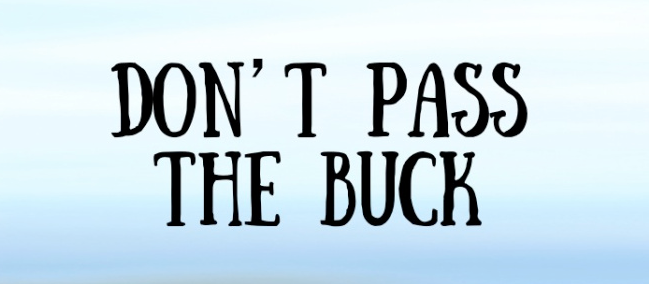(单词翻译:单击)
听力文本
Now, it's time for Words and Their Stories.
Each week, we try to have a new story. In these stories, we explain English words and expressions. Often, they come from day-to-day events in our lives and become part of the language.
The expression "pass the buck" is an example. A card game may be the origin of this American expression.
Gamblers in saloons of the Old West may be responsible for "pass the buck". To understand how we have to learn about the game of poker – then and now.

In poker, each player, one after another, mixes the playing cards, and then passes them out. They deal them. Back then, an object -- often a Buck knife -- was placed in front of a player whose turn it was to deal.
A man named Hoyt Buck created the Buck knife back in the early 1900s. As a young blacksmith in Kansas, Buck wanted to find a better way to make knife blades stronger and hold their sharp edge longer. He produced his first Buck knife in 1902 and the family company is still making Buck knives today.
But let's get back to the poker game.
Okay, so the person with the marker, or the "buck," in front of them had a decision to make. They could either keep the deal or give it to another player. They would pass the Buck knife, or other similar marker, when they did not want the responsibility of dealing.
So, today when someone passes the buck, they fail to take responsibility for a problem. They want someone else to solve it.
"Pass the buck" led to another American expression. Former President Harry Truman, who enjoyed playing poker, made this one famous.
A friend of Truman's presented him with a small sign for his White House office. The sign said: "The buck stops here." This meant that Truman was responsible for what happened in the country. The president cannot "pass the buck."
There are other ways to express the meanings of "pass the buck".
You could also say "avoid responsibility" or even "evade responsibility".
If you shift the blame, you try to make someone else take responsibility for something you did. Many work places have these types of people. For whatever reason, they are unable to take responsibility for their mistakes. These types of people try to shift the blame to others.
When you evade responsibility, you refuse to own up to something you did. You can also evade responsibility for something you failed to do. However, evading responsibility does not necessarily mean placing it on someone else. "Passing the buck" does – you force someone else to deal with a problem or issue.
Sometimes we simply say we "own it" -- "it" being the mistake. If you "own" something that has gone wrong, you take full responsibility for it. We also say things like, "That's on me!" or "My bad!" These are very casual and common ways of saying, "It's my fault!"
Now, let's hear the words and expressions in a short dialogue.
A: Okay, so our meeting with the client is tomorrow at 4 pm. They want to see a mock-up of our interactive web page. I have all the content written. Are you finished with the draft yet?
B: Um, Allen is making the draft web page.
A: He told me that you wanted to do it.
B: I did not say that. My job is to find images and videos. He is trying to pass the buck ... again!
A: Yeah, he does that a lot, doesn't he. Well, we need something to show the client tomorrow. Do you have the images?
B: Yeah, they're on this flash drive. Wait. Where is the flash drive?
A: I don't know.
B: Oh man! I do! I left it on the train coming into work today.
A: So, let me get this straight. Our meeting with the client is tomorrow afternoon and we don't have a web page or images.
B: Losing the images is on me. I'll load another flash drive today. But I have nothing to do with the web page!
A: Don't worry about that. I'm project manager. So, ultimately the buck stops with me. You just get me the videos and photos by close of business. I'll take care of the rest.
B: Got it!
And that's the end of this Words and Their Stories.
Practice using one of the expressions you heard here. Describe a time when maybe you passed the buck or owned up to a mistake!
I'm Anna Matteo.
重点解析
1.one after another 一个接一个地;接连地;陆续地
The guests came one after another.
客人们陆续来了。
2.own up 承认;供认;坦白
You had better own up.
你还是招了的好。
3. flash drive 闪存盘;闪盘驱动器
System Sweeper can boot from a USB flash drive or a CD-ROM.
“系统清理器”可以从U盘或者光盘中启动。
4.close of business 停止营业
Currency requirements demand point-in-time consistency, such as close of business.
当前需求要求时间点一致性,例如业务关闭。
参考译文
现在是VOA学英语《词汇掌故》节目时间。
每周,我们都努力想出一个新的故事。我们通过这些故事来解释英语单词和表达。这些单词和表达一般出自我们日常生活中的事件并成为我们语言的一部分。
表达“pass the buck(推卸责任)”就是其中一个例子。这个美式表达可能源于一种纸牌游戏。
旧西部酒吧中的赌徒也许和“pass the buck”这个表达有关。为了弄懂其中的缘由,我们得了解下当时和现在的扑克游戏。
在扑克游戏中,每个玩家轮流洗牌,然后分发纸牌。玩家决定怎么打这些牌。那时候,通常会把一把巴克刀放在轮到其打牌的玩家面前。
20世纪早期,一位名叫霍伊特·巴克的人发明了巴克刀。作为堪萨斯州的一名年轻铁匠,巴克想找到一个能让刀片更加坚韧且刀锋更长的更好方法。他于1902年生产出了他的第一把巴克刀,他的家族企业现如今依然从事生产巴克刀。
让我们继续说扑克游戏。
好的,那么身前有标记或者说有巴克刀的人就得做出决定。他们可以发牌或者把标记传给下一个玩家。当玩家不想承担发牌的责任时,他们可以把巴克刀或者其他类似的标记传递出去。
所以,今天,当有人“pass the buck”,他们没有对问题负责任。他们希望其他人去解决问题。
“pass the buck”还衍生出了另一个美式表达。喜欢玩扑克的前总统哈里·杜鲁门让这个表达流传开来。
杜鲁门的一个朋友送给了他的白宫办公室一个小标牌。标牌上写着:“推责止于此。”这是说杜鲁门得为全国发生的事情负责。总统不能推卸责任。
还有其他表达“推卸责任”含义的方式。
你也可以说“avoid responsibility(逃避责任)”或者甚于“evade responsibility(逃避责任)”。
如果你推卸责任(shift the blame),你试图让其他人替你做的事情负责。许多工作场合会有这种类型的人。不论出于什么原因,他们不能为自己的错误负责。这些人想把责任推给别人。
当你逃避责任的时候,你拒绝承认自己做的事情。你也可以逃避自己做事失败的责任。然而,“逃避责任”不一定意味着把责任推给别人,但“推卸责任”是这样。你强迫别人去处理问题。
有时候,我们直接就说是我们的问题(we own it),这里的“it”指的是“错误”。如果你“拥有(own)”有问题的某事物,意思是你为此事承担全部的责任。我们也会说如“那是我的责任!(That's on me)”或者“我的错(My bad!)!”这些都是非正式且常见的说法,“这是我的错!(It's my fault!)”
现在,让我们来听一段含有这些单词和表达的短对话。
A:好的,我们的客户会议是在明天下午四点。他们想要看一看我们交互式网页的模板。我已经写好了所有的内容。你初稿完成了没?
B:呃,艾伦负责网页的初稿。
A:他告诉我你想做那个初稿。
B:我没有说过。我的工作是图片和视频。他是又想甩锅给别人!
A:是啊,他甩锅很多次了,是吧。好吧,我们需要东西好明天展示给客户看。你有图片吗?
B:是啊,他们在这个U盘上。等下。U盘在哪?
A:我不知道。
B:哦,天啊!我的错!我把它丢在今天来上班的火车上了。
A:好吧,让我弄清楚。我们和客户的会议是在明天下午,但我们没有网页或者图片。
B:丢失图片是我的责任。我今天会存到另一个u盘上。但是网页跟我没关系!
A:不用担心。我是项目经理。因此,最终责任在我。你只要在下班前给我视频和图片就好。其余的我来处理。
B:好的!
这就是本期的《词汇掌故》节目。
练习你收听到的其中一个表达。描述一个你也许推卸责任或者承担责任的时候!
我是安娜·马特奥。


